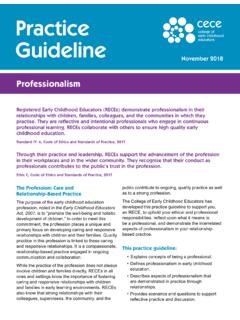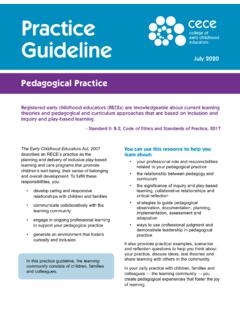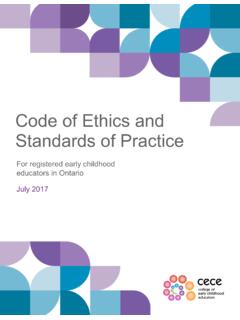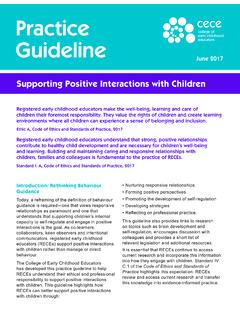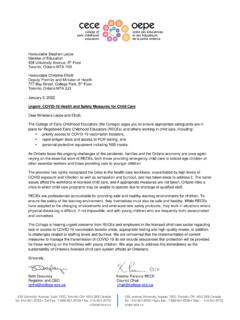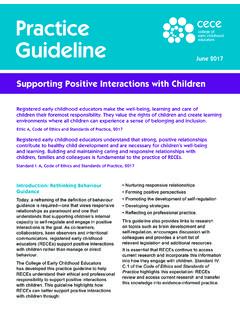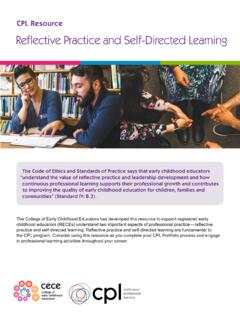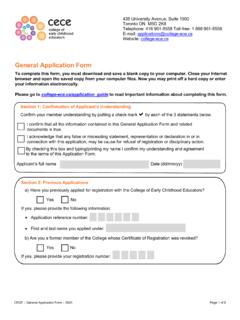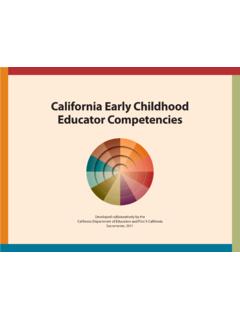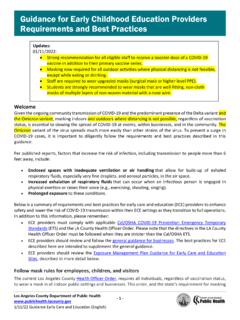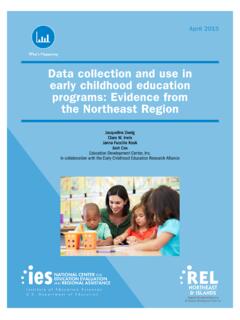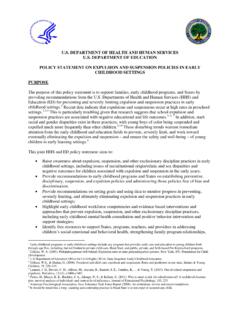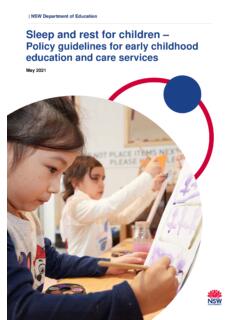Transcription of The Importance of Early Childhood Educator Mental Health ...
1 The Importance of Early Childhood Educator Mental Health & Well-Being:A guide to supporting educators Fall 2019, V2 Julie Ingriselli, MPEd, RECE, BAScKendra Schempp, MPEd, RECE, BASc1 Educator WellnessUnderstanding WellnessWhen considering wellness, we are looking at the overall physical and Mental well-being of an individual. Our current Early years pedagogy highlights the Importance of fostering children s well-being and, since educators play a key role in children s development, it is essential to also consider and support educators overall working in the Early years setting have complex roles with many different responsibilities and tasks (Rose & Rogers, 2012). By respecting, listening to, and valuing educators for their daily work, we are supporting their overall well-being (Ontario Ministry of education , 2018). Why is Wellness Important?Research tells us that children are affected by how their educators view themselves (Khattar& Callaghan, 2015) and that children are at the greatest risk when the people caring for them are experiencing persistent and severe adversities (Ontario Ministry of education , 2014).
2 In developing high quality learning environments, we must be aware that a key factor is the adult role (Rose & Rogers, 2012). By supporting educators well-being, we have the ability to improve their performance and the classroom quality (Jennings, 2014). Consistent with how we want children to feel, we want educators to feel active and important in their daily work (Malaguzzi, 1994). 2 educators who feel valued, respected and heard will be motivated to provide the best possible education and care for children (Ontario Ministry of education , 2018) Turnover and Retention3 The challenges associated with Educator turnover and retention have become a common discourse in the field. Current research tells us that many communities are struggling to recruit and retain high quality staff (Ontario Ministry of education , 2018). Feeling confident and competent is an important factor in Educator retention (Anderson, 2013), however the field continues to be undervalued and often viewed as babysitting (Ontario Ministry of education , 2018) resulting in educators feeling unimportant in their work.
3 When educators needs are given no platform and they have no stake in the way things take place, it becomes evident that they would rather be elsewhere (Stremmelet al., 2015). Furthermore, when educators are consistently expected to display positive emotions and suppress their authentic feelings without having the opportunity to discuss challenges, they can begin to feel alienated in their work. This is believed to contribute to psychological distress which then results in burnout and removal from the field (Cumming & Wong, 2018). DID YOU KNOW? Personal factors are also understood to influence an employee s work-related well-being When individuals perceive that high levels of effort are not rewarded, it results in high stress Better psychological well-being and job satisfaction are associated with better job performance (Cumming & Wong, 2018)Critical ReflectionIn the growing field of Early Childhood education and care, practitioners are confronted with a multitude of approaches, values, and beliefs surrounding the child, the Educator , and the family.
4 These variations may cause stress and anxiety for educators whose own beliefs and approaches do not match those predominantly displayed in the field or their workplace. How do we navigate and sift through these conflicting ideas to find the options which are best suited to us and our community? educators engaging in critical reflection can uncover true emotions and their triggers which may be masked by expectations for authentic positive emotions in the workplace (Cumming & Wong, 2018). A platform for exploring hidden or marginalized -ways of knowing challenges dominant discourses that exclude these alternatives to the norm (Moss, 2017) and can improve educators Mental well-being. educators can explore new ideas, adjust their practice, and achieve more positive outcomes for themselves, the children, and their families (Ontario Ministry of education , 2018). The Educator , when positioned as a researcher, is empowered to continually grow through questioning and exploration (Edwards & Gandini, 2015).
5 Critical reflection is an opportunity for educators to ask deep questions about taken-for-granted practices and long-standing views, while considering new approaches (Ontario Ministry of education , 2014). Critical reflection is a personalized tool available to every practitioner in mediums such as: journaling, conversations with colleagues, reading or research, a creative outlet, as pedagogical documentation offers insight into children s thinking, feeling, and worldview (Wien, 2013), critical reflection can illuminate those of Professional EducatorReflection for Professionalism Who are we as Early years practitioners? This fundamental question shapes our practice and our interactions with children and their families. Research tells us that it is challenging for educators to develop an accurate professional identity that reflects the complexities of our role (Cumming & Wong, 2018). The image of the Educator as a professional is enhanced when the Educator themselves matches the image of the child as rich in potential, powerful, connecting, and competent (Khattar& Callaghan, 2015).
6 When we, as Early years practitioners, normalize everyday research we more accurately relate with others and the world (Rinaldi, 2003), a skill that confidently guides us as professionals seeking to enhance our field. Critical reflection enables educators to become more intentional, responsive, informed, and confident (CECE, 2017). When confronting dominant approaches or ideas, educators who have critically reflected on personal views, beliefs, and practice are more prepared to act differently and challenge the status quo (Bown& Sumsion, 2016). Confidence is also a key component in Educator retention (Anderson, 2013).The act of highlighting the Mental Health challenges experienced by Early years practitioners emphasizes the complex demands in the field (Cumming & Wong, 2018). Reflective practice helps us to create coping strategies, problem-solving skills, and to build resiliency in order to continue effectively practicing a profession that is increasingly dynamic (CECE, 2017).
7 5 Tips & StrategiesSupporting our Practitioners Mental Well-BeingManagement teams and colleagues can support one another s Mental well-being through:Mutual respect (Underwood et al.,2016)Professional development opportunities related to prominent issues (Underwood et al,2016)Fair compensation for all practitioners (Ontario Ministry of education , 2018)Acknowledging and rewarding efforts and intelligences (Malaguzzi, 1994)Creating a welcoming, calm space for conversation and reflectionAllotting time for collaboration and discussion between colleagues and management teamsEducators must feel empowered and enlightened to navigate the complexities and tensions found within the evolving field of Early Childhood education and care (Stremmelet al., 2015). As such, teacher education programs and professional development opportunities should discuss the Importance of Educator well-being and the benefits of engaging in critical should be offered to educators at all stages of their professional career as challenging new approaches and ideas come to light every day.
8 Tensions between practices employed by new and experienced practitioners and between professions, such as certified teachers and registered Early Childhood educators (Underwood et al., 2016) are common in this expanding field. Therefore, the ongoing maintenance and support of practitioner well-being is essential to the professional image and quality of Early education and care afforded children and families. 6 Reflection QuestionsLet s Start ReflectingTo be in question signifies doubts about our own practice, children, curriculum, and education in general (Vintimilla, 2016). It is hard to break free from ideas and approaches which have held great influence and significance in our daily practice (Moss, 2017) and pinpointing exactly where our emotions, reactions, and decisions come from takes time, patience, and practice. Listed below are provocations to begin your journey into challenging dominant discourses, inequities and disparities in your Early learning setting, and your emotions surrounding contentious issues within Early Childhood education and care.
9 Does Educator /practitioner well-being look like for you? your image of yourself as an are some of the conditions needed in supporting Early years educators ? are your coping strategies? makes you feel uncomfortable, inadequate, challenged? can you change your current feelings or experiences? is hindering your progress? can support you in this change? Only a real crisis actual or perceived produces real change. -Milton Friedman7My Thoughts8 Mind Map SeedsWagesTimeSupportKnowledgeStressJoyI dentityRoleHow do you feel when you hear these trigger words? What are the first things that come to mind? 9 ResourcesAssociation of Early Childhood educators of Early Childhood Growth and DevelopmentOntario s Early Childhood educators Upgrade & Leadership Health and Wellness SupportConnexOntario1-866-531-2600 Mental Health AssociationSearch for your local Canadian Mental Health Association the Authors11 Julie Ingriselli and Kendra Schempp are recent graduates of the MPEdprogram at Western University.
10 As RECEs, Julie and Kendra are passionate about the field of Early Childhood education and care and are drawn to the topic of Educator Mental Health and well-being. After experiencing challenges with their own Mental well-being while working in the field, they are now dedicated to raising awareness and discussing Mental Health in Early Childhood education and offering support to educators across the country. We would love to connect with you! Find us on Instagram @EducatingTogetherBlogor on our blog at , (2013) Preparing the Next Generation of Early Childhood Teachers: The Emerging Role of Interprofessional education and Collaboration in Teacher education , Journal of Early Childhood Teacher education , 34:1, 23-35, DOI: , K. & Sumsion, J. (2016). Generating visionary policy for Early Childhood education and care: Politicians and Early Childhood sector advocate/activists perspectives. Contemporary Issues in Early Childhood ,17(2),192 209.
